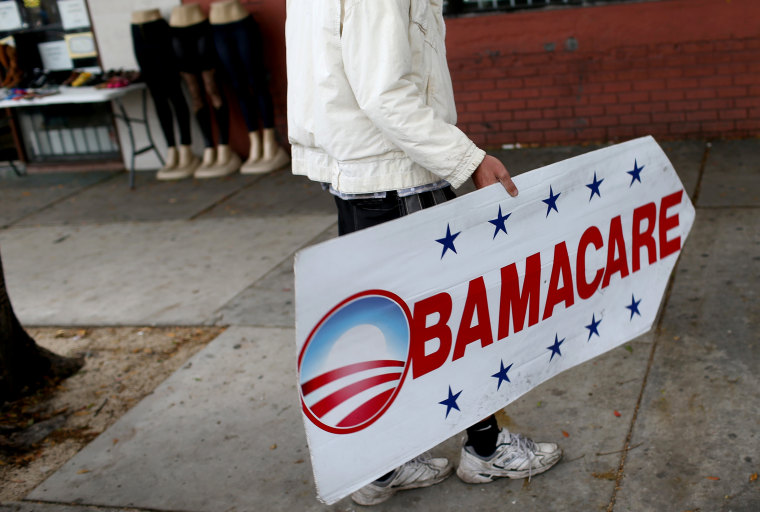As complicated as the King v. Burwell case may seem, the consequences are pretty straightforward: if Republican justices inexplicably rule to gut the American health care system, every state without its own exchange marketplace is in deep trouble.
At the heart of the case is the ridiculous argument that the ACA denies insurance subsidies to every consumer who enrolls through healthcare.gov -- the mechanism consumers have relied on in 37 states to get insured. If the Supreme Court's majority agrees, then 6.4 million Americans will be slated to lose the subsidies that make their health security affordable.
With that possibility all too real, a scramble is already underway to deal with the unnecessary, Republican-imposed chaos. TPM
reported yesterday, for example, on developments in Pennsylvania.
Pennsylvania became the first state Tuesday to publicly put in motion a back-up plan to protect its federal health insurance subsidies in the event the Supreme Court dismantles a key part of President Obama's health care law. Tuesday evening, Democratic Gov. Tom Wolf announced the state this week had submitted an application to the federal government to take over the state's federal exchange. The move would allow Pennsylvania residents to continue to receive federal subsidies towards purchasing health insurance if subsidies on the federal exchange are invalidated by a ruling in the King v. Burwell case expected later this month.
For the nearly 400,000 Pennsylvanians who've gained coverage, that's certainly good news, but Wolf's plan is dependent on support from the state's Republican-led legislature, so success is far from assured.
Of course, it's not just Pennsylvania. Delaware is in a similar situation and it's also
moving forward with plans to protect its residents from a far-right court ruling.
Officials in states like
Michigan and
Ohio have also indicated their willingness to prevent their constituents from suffering if GOP justices start taking Americans' health coverage away.
This state-by-state scramble may or not be effective in quelling the systemic chaos, but the possibility of millions of families struggling with health care turmoil is starting to rattle the very Republicans who've cheered on this case from the outset.
The Hill reported this morning:
House conservatives are hinting at support for a temporary extension of Obama-Care subsidies if the Supreme Court cripples the law, even as they set up a working group to develop their own plan. Members of the conservative House Freedom Caucus told The Hill they are setting up a group of four or five lawmakers, led by Rep. John Fleming (R-La.). The lawmakers will develop a plan meant to influence the main House working group led by Rep. Paul Ryan (R-Wis.) and two other panel chairmen, which Fleming complained is meeting in "secret." While working on their own ideas, Freedom Caucus members are also open to something like Sen. Ron Johnson's (R-Wis.) idea to temporarily extend subsidies.
For those who know anything about far-right members of Congress, there's ample room for skepticism -- the specifics of their plans are bound to be dreadful -- but the fact that some congressional Republicans are even thinking about extensions is itself evidence of a politically complex situation.
Even the most aggressively anti-healthcare policymakers are understandably anxious. Sure, they hate President Obama and have an irrational opposition to his signature domestic policy initiative, but no one is eager to tell their constituents, "Vote for me; I'm the guy who took your family's health security away."
Indeed, looking at this purely as an electoral matter creates an even more worrisome picture for Republicans. Citing data from the Kaiser Family Foundation, the
Washington Post's Greg Sargent
noted yesterday that the "greatest numbers of people who stand to lose subsidies live in states that are key presidential battlegrounds and home to some of the most contested Senate races of the cycle."
* In Florida, 1,324,516 people are at risk of losing subsidies. If that happens, they would be hit by an average 359 percent premium increase. * In North Carolina, 458,738 people are at risk of losing subsidies. They'd be hit by an average 336 percent premium increase. * In Pennsylvania, 348,823 people are at risk of losing subsidies. They'd be hit by an average 177 percent premium increase. * In Virginia, 285, 938 people are at risk of losing subsidies. They'd be hit by an average 287 percent premium increase. * In Wisconsin, 166,142 people are at risk of losing subsidies. They'd be hit by an average 252 percent premium increase. * In Ohio, 161,011 people are at risk of losing subsidies. They'd be hit by an average 190 percent premium increase. * In Indiana, 159,802 people are at risk of losing subsidies. They'd be hit by an average 271 percent premium increase.
Both parties can agree on one thing: this is a major 2016 campaign issue just waiting to happen, and it's unlikely to do the GOP any favors.
Just so we're clear, some of this is speculative because we simply don't yet know what the Supreme Court is going to do. If the high court's majority is responsible and takes its responsibilities seriously, the question about consequences is moot -- the plaintiffs will lose, the case will be a laughingstock, and the political world can simply move on to other fights.
But the threat of a victory for the plaintiffs is real, and the potential impact is just now coming into focus.
